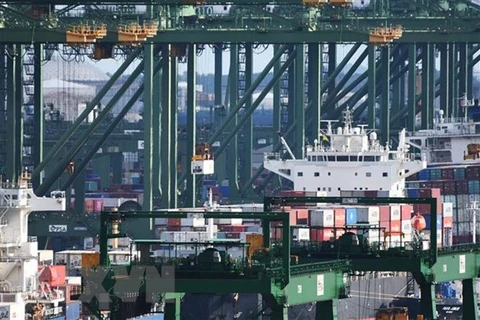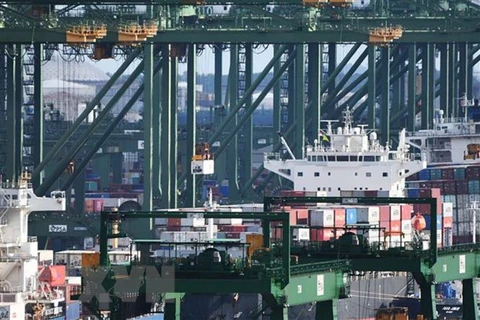Singapore (VNA) – Singapore's economy will grow by 4 percent next year, likely be driven by improvements in the construction sector as well as manufacturing and finance, according to a survey of professional forecasters.
Based on estimates by 22 economists and analysts, the quarterly survey conducted by the Monetary Authority of Singapore (MAS) showed the island country is likely to register growth between 3 percent and 4.9 percent next year.
It is similar to the Ministry of Trade and Industry’s maiden forecast for next year last month which said Singapore's gross domestic product (GDP) will grow by 3 percent to 5 percent next year, after an estimated expansion this year of around 7 percent.
Respondents to the MAS survey, released on December 8, projected current year growth at 6.9 percent, up from 6.6 percent in the previous survey.
For 2022, construction was seen as the sector that will expand the most. The median forecasts for construction came at 15.8 percent, followed by accommodation and food services at 9.6 percent.
Forecast for manufacturing growth came at 3.3 percent, while growth in the finance and insurance sector will be around 4.1 percent next year.
The prospect of reopening borders to international travel emerged as the most frequently cited upside surprise to Singapore's growth outlook.
The respondents also flagged upside from a stronger-than-expected expansion in manufacturing output supported by robust global electronics demand, as well as from faster-than-expected global growth, driven for instance by trade and expansion in production capacity.
On downside risks to the growth outlook, the respondents showed concern over a further deterioration in the COVID-19 situation, and an associated retightening in public health measures.
Finally, half of the respondents also pointed to risks from faster-than-expected tightening in monetary policy by major central banks, arising, for instance, from a larger-than-expected pick-up in inflation./.
Based on estimates by 22 economists and analysts, the quarterly survey conducted by the Monetary Authority of Singapore (MAS) showed the island country is likely to register growth between 3 percent and 4.9 percent next year.
It is similar to the Ministry of Trade and Industry’s maiden forecast for next year last month which said Singapore's gross domestic product (GDP) will grow by 3 percent to 5 percent next year, after an estimated expansion this year of around 7 percent.
Respondents to the MAS survey, released on December 8, projected current year growth at 6.9 percent, up from 6.6 percent in the previous survey.
For 2022, construction was seen as the sector that will expand the most. The median forecasts for construction came at 15.8 percent, followed by accommodation and food services at 9.6 percent.
Forecast for manufacturing growth came at 3.3 percent, while growth in the finance and insurance sector will be around 4.1 percent next year.
The prospect of reopening borders to international travel emerged as the most frequently cited upside surprise to Singapore's growth outlook.
The respondents also flagged upside from a stronger-than-expected expansion in manufacturing output supported by robust global electronics demand, as well as from faster-than-expected global growth, driven for instance by trade and expansion in production capacity.
On downside risks to the growth outlook, the respondents showed concern over a further deterioration in the COVID-19 situation, and an associated retightening in public health measures.
Finally, half of the respondents also pointed to risks from faster-than-expected tightening in monetary policy by major central banks, arising, for instance, from a larger-than-expected pick-up in inflation./.
VNA
























